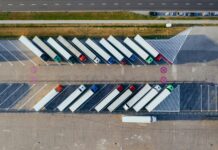
With the UK government confirming its pledge to zero-emission HGVs in the UK by 2040 in November of 2021, it’s clear that the days of petrol and diesel trucks are numbered. Heavy goods vehicles (HGVs) are known for their high carbon emissions, and the adoption of Alternative Fuel Vehicles (AFVs) is seen as the answer to the problem. That said, the successful transition to these new vehicles depends not just on the technology, but also on AFV training for drivers and fleet managers.
AFVs include hydrogen-powered vehicles, electric trucks and those that run on compressed natural gas (CNG) or biofuels and they’re set to greatly reduce the impact the UK’s transport industry has on the environment. They emit little to no CO2, allowing companies to adhere to ever-tightening environmental regulations.
AFV Training is Crucial to the Switch
At present, AFVs make up just 1% of the total number of trucks operating on the UK’s roads, and moving that figure up to 100% by 2040 is not without its challenges. AFVs often have different driving dynamics, fueling requirements, and maintenance needs, meaning that without adequate AFV training, drivers might not be able to get the best performance from these trucks.
AFV training programs are designed to equip drivers and fleet managers with the knowledge and skills needed to operate alternative fuel vehicles and they’re essential for a number of reasons:
- Achieving high levels of efficiency: HGV drivers who’ve never sat behind the wheel of an AFV are not likely to be familiar with the technologies they use. For instance, if a driver doesn’t fully understand the handling characteristics of hydrogen fuel cells or EV regenerative braking, they probably won’t drive them efficiently, meaning higher operational costs.
- Safety considerations: When dealing with different AFV fuel types, certain new safety protocols come into play. Hydrogen can be very dangerous and requires different handling when compared to diesel or petrol. Without training in how to use them, it increases the chances of accidents happening through mishandling.
- Understanding AFV maintenance: Something else you have to consider when operating a fleet of AFVs is how they’re maintained. For example, traditional HGVs have many moving parts and require oil changes, while electric trucks need to have their batteries carefully monitored and managed. Training ensures that they’re properly maintained, meaning they’ll have a longer lifespan and will be less likely to break down.
- Minimising environmental impact: There’s no two ways about it, when an HGV driver gets AFV training, they’re able to operate trucks more efficiently. When that happens, they directly contribute to reducing the impact of the UK’s haulage industry. They can optimise routes, and reduce idling, both of which lead to lower emissions.
Supporting the Transition to Alternative Fuel Vehicles
The move to AFVs is coming and it’s imperative that the UK’s transport industry gets ready for its introduction. At HGVC, we’re fully behind all moves to make the haulage industry greener and less harmful to the environment and we hope to play a central part in ensuring all professional HGV drivers get the AFV training they need to adjust.
If you’d like to know more about our industry-leading HGV training that allows companies to circumvent the ongoing driver shortage, please take a look around our website. Alternatively, to speak to us about your needs directly, call us on 0330 818 8888 or click on our ‘contact us’ link and send us a message.





